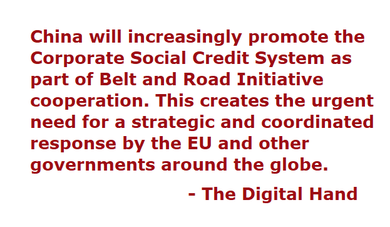China’s Social Credit System: DW
China's Social Credit System: DW
 Read the article from Deutsche Welle about China’s social-reputation scoring system for companies.
Read the article from Deutsche Welle about China’s social-reputation scoring system for companies.
Read the report – The Digital Hand: How China’s Corporate Social Credit System Conditions Market Actors – from the European Union Chamber of Commerce in China.
Highlights:
“The System is part of a major shift in China’s market access regime. China continues to open its market to international players, moving away from hard market access constraints like joint venture requirements and investment catalogues, but at the same time, the Corporate SCS is emerging in the background to enhance the government’s ability to control companies’ behaviour. The lifting of hard market barriers can therefore be explained, at least in part, by the government’s growing confidence in its ability to influence companies, both foreign and Chinese, in a more nuanced way.”
Three steps to the ratings:
● Government definition of ratings rquirements
● Monitoring of companies’ behavior
● Algorithm-based ratings of companies with direct consequences
Impacts of Social Credit System Beyond China’s Borders
● China will increasingly promote the corporate SCS as part of BRI cooperation
● The corporate SCS already rates behavior of Chinese companies operating in foreign markets.
● This rating mainly targets Chinese companies that participate in Belt and Road Initiative projects.
● Monitoring of foreign firms’ behavior in other markets, including relationships with Chinese firms even if they are not present in China, is possible.
● Chinese think tanks s evaluate the effectiveness and exportability.
● A comprehensive non-financial credit rating like the corporate SCS is envisaged to counter the dominance of Western credit-rating companies.
● Ratings would cover political, economic, financial, social and environmental credit.
● Cooperation agreements and meetings on social credit have been held with Mongolia, Thailand, France, the Czech Republic, Saudi Arabia and other nations.